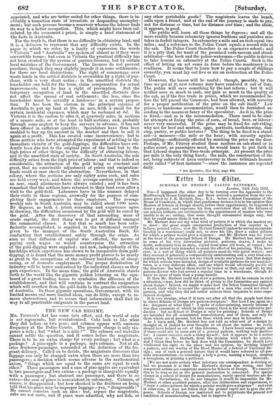THE NEW CAB REGIME.
Mn. Fliznov's Act has come into effect, and the world of cabs is not regenerate, but revolutionized. Cabs look as like what they did before as two peas ; and cabmen appear with ominous frequency at the Police Courts. The present charge is only six- pence a mile ; but "what is a mile ? " The cabman and traveller cannot settle the question, and it comes before the magistrate. There is to be an extra charge for every package ; but what is a package ? A pine-apple is a package, says cabman. Not at all, cries fruiterer-passenger, astounded at the definition of the fra- grant delicacy. Called on to decide, the magistrate discovers that luggage can only be charged extra when there are more than two passengers ; a decision which seems adverse to the mathematical axiom, "things which are equal to the same are equal to each other." Three passengers and a case of pine-apples are equivalent to two passengers and two extras—a package is chargeable equally with a passenger ; but abstract one passenger, and there is no extra—the case of pines is nonexistent in cabometry. Cabman, of course, is disappointed ; but how shocked is the fruiterer on being told that his pines may be improper luggage—yea, " disagreeable !" He cannot conceive such an idea : but, argues the magistrate, cabs are not carts, and if pines were admitted, why not fish, or any other perishable goods ? The magistrate leaves the bench, calls upon a friend, and at the end of the journey is made to pay, not for distance or time, but for distance and time; and the claim, it appears, is good.
The public will learn all these things by degrees ; and all the more readily because cabometry ignores fractions and punishes mis- takes in forfeit integers. In cabometry a mile and an inch equal two miles ; and a reference to the Police Court equals a second ride in the cab. The Police Court therefore is an expensive school ; and it is a pity that, for want of the promised vade-mecum and stand- arbitrator—the book and the police-waterman—the public is driven to take lessons on cabometry at the Police Courts. Such is the effect of letting an act come in force before the machinery is in readiness. It seems that to learn how to pay a couple of shillings correctly, you must lay out five or six on instruction at the Police Court.
However, the lesson will be useful ; though, possibly, by the time we get at it, new reforms may have rendered it out of date. The public will save something by the last reform ; but it will neither save so much in cash, nor gain so much in the quality of the cab, as if the free trade in prices, which we recommended be- fore the bill passed the Commons, had been allowed, with security for a proper notification of the price on the cab itself.* Low prices or handsome accommodation, would then be furnished ac- cording to the means or fancy of the speculator. As it is, the price is fixed,—and so is the accommodation. There used to be simi- lar attempts at fixing the price of corn, of bread, beer, or labour : never very successful. If the price may be fixed for cab-riding, why not for beef and mutton, eggs, portraits toothdrawing, dan- cing, pastry, or public lectures ? The thing to be fixed is a stand- ard—a measure—the mile or the hour; with security against squabbling—sufficiently effected by marking the price on the door. Perhaps, if Mr. Fitzroy studied these matters on cab-stand or in police court, as passengers must, he would learn to put faith in that Liberal dogma the Free-trade principle. At present the price per mile is the only thing fixed; the mile, the construction of the act, being subjects of keen controversy in those tribunals humor- ously called "of first instance "—since the instances are repeated daily.
• See Spectator, 21st May, page 488.


























 Previous page
Previous page